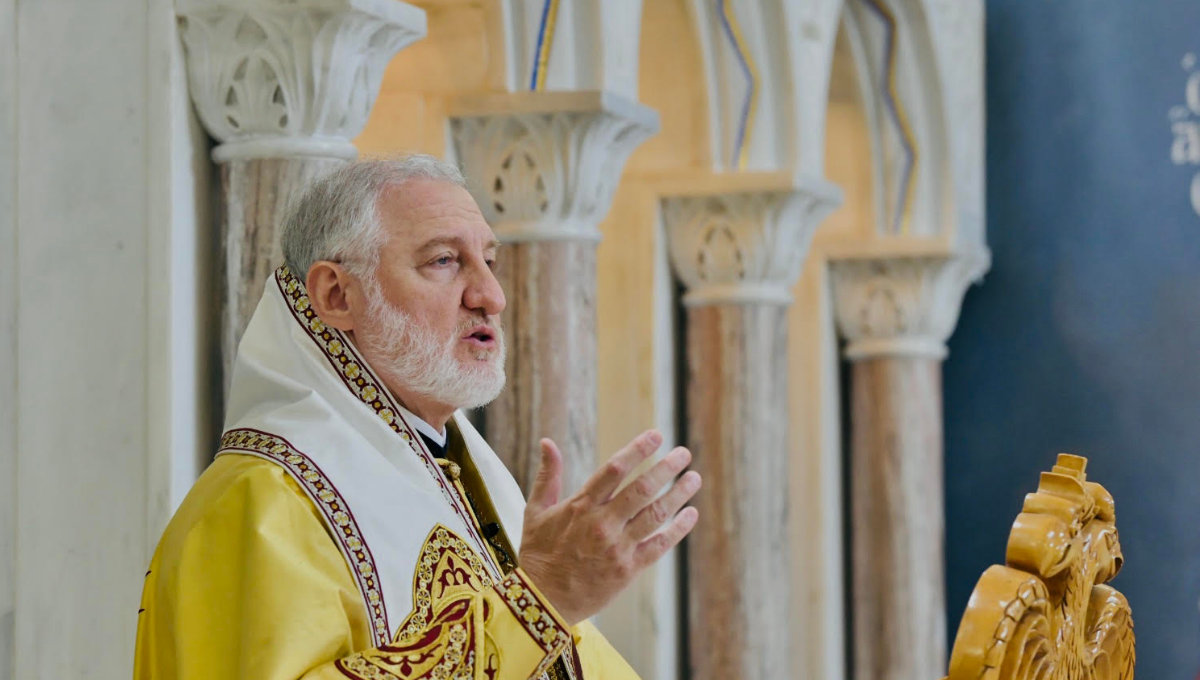His Eminence Archbishop Elpidophoros of America
Homily for the Sixth Sunday of Saint Matthew
Assumption Greek Orthodox Church
Port Jefferson, New York
August 1, 2021
Beloved Sisters and Brothers in the Lord,
As we commence the days of the Holy Fast for the Dormition of the Most Holy Mother of God, I rejoice that I am with you all in this magnificent church and community that is named in Her honor.
The Fast commences today with the special commemoration of the Procession of the Holy Cross. For it was during these days of the Dormition Fast, that in Constantinople of old, there were often breakouts of disease in the hot month of August. Therefore, the reliquary of the Holy Cross was brought forth from the treasury of Hagia Sophia and processed throughout the City, and offered to the Faithful for veneration.
How little has changed through the centuries! We find ourselves still facing the modern day plague of the pandemic. And we still turn to the Cross of the Lord for comfort, solace and healing. For the Cross, though it was an instrument of torture and death, has become for us a staff of healing and, indeed, a means of eternal life.
By a happy coincidence, then, the Gospel reading today – for the Sixth Sunday of Saint Matthew in the lectionary cycle – speaks of the Cross in a very unique way. You recall that it is a narrative of our Lord healing a paralytic man in His hometown of Nazareth. The man was carried into His presence by people with faith that Jesus could heal him. But the Lord did not say: “Be healed of your infirmity.” Instead, He said:
Θάρσει, τέκνον· ἀφέωνταί σοι αἱ ἁμαρτίαι σου.
Take heart, my child; your sins are forgiven you.
For the religious authorities who were there – the Scribes – this was catastrophic! Only God could forgive sins. So, if Jesus was pronouncing forgiveness, it could only mean one thing: that He was affirming He was God, or at least His equal.
My dear Christians – I want you to think of the very first words that our Lord uttered when He was being crucified. At the moment He was being nailed to the Cross, He said: “Father, forgive them, for they know not what they do.”
You see, forgiveness is the first step in any and all healing. Healing of the body lasts but a span of years, but the healing of soul and heart lasts for eternity. The Lord forgave everything from the Cross, because on the Cross He conquered sin by His sinless life, and death by His willing death. We should all “take heart” from this ineffable love of God. Yet, there is more.
To answer His critics, who were holding their tongues, and to encourage the Paralytic Man, who was waiting to see what was going to happen, the Lord turned the tables and said:
“For which is easier, to say ‘Your sins are forgiven,’ or to say ‘Rise and walk?’ But that you may know that the Son of Man has authority on earth to forgive sins,” He then said to the paralytic – “Rise, take up your bed and go home.”
And here is where the Cross appears, but in another form. The now-walking Paralytic, carrying his bed, is an image of every Christian, forgiven from their sins, and carrying their own cross, as the Lord commanded:
“If you would come after Me, you must deny yourself, take up your cross, and follow Me.
Thus, my beloved Christians, we arrive at the conclusion of our happy coincidence of feast and reading. The Cross, Whose Procession we celebrate today – the Cross of love and forgiveness – is also the cross the Lord invites us to carry. He calls us to rise from the bed of self-pity and self-obsession, where we are paralyzed by our fears and by our selfishness. He forgives all our mistakes, errors in judgment and sins – both voluntary and involuntary.
And He says: “Rise, take up your bed and go home.”
We rise, because He is risen from the dead, and His power enables us.
We take up our cross – the bed of self-sickness and paralysis – and we carry it for the sake of loving others, forgiving others, being kind to others, and being generous to others.
And then, we find our way home to a place of self-acceptance and love; home to relationships built on foundations of kindness, respect and generosity; home to lives that are lived to their fullest without greed and without rapacity.
And finally, home to the Celestial Abode of our Heavenly Father, Who is glorified with His Son, and All-Holy Spirit; now and ever, and unto the ages of ages. Amen.

